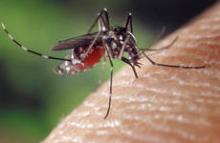Hurricane Sandy ripped through the East Coast of the United States and blew the effects of climate change right back into the middle of the discussion. Though some draw a direct link between Sandy and climate change (such as this Scientific American blogger), others describe a more nuanced relationship between the two (such as this Washington Post blogger).
But there is a subconversation going on as well; this one focuses on whether climate change will bring diseases here that are not normally seen in our region. An entire session on the "Epidemiology and Diagnosis of Febrile Illness in the Era of Global Climate Change" was offered at the annual Interscience Conference on Antimicrobial Agents and Chemotherapy (ICAAC), held in San Francisco in September.
But this, too, is a more nuanced than a direct link. It’s not that climate change will cause giant mosquitos to swarm north from the tropics and bite us all, though that’s usually what the tabloid press would like malaria expert Colin Sutherland, Ph.D., to say. "The big threat from global warming is not mosquitos, but that people will move much more. The people are the problem," said Dr. Sutherland of the London School of Hygiene and Tropical Medicine.
In other words, as people flee severe drought, natural disasters, and other extreme weather events that may be associated with climate change, they can bring with them the disease they’ve acquired from mosquitos in their homeland. Then mosquitos in their new location may transmit the disease from them to others.
The quality of malaria diagnosis varies widely even in endemic areas. "Are we confident that our health systems would promptly diagnose malaria in a febrile patient with no indicative travel history?" Dr. Sutherland said at ICAAC. "No. You wouldn’t order a malaria test."
Disease migration through travelers – whether humans or animals – isn’t new. West Nile virus arrived in the United States in 1999, spread across the country, and produced perhaps its worst year of infections here in 2012. A CBS News report said certain climate events may help spread West Nile and malaria here, though they never mention "climate change" per se.
Dr. Delia A. Enria of Argentina argued at the ICAAC session for better data collection on dengue fever (yet another mosquito-transmitted disease), including mandatory reporting of dengue cases to governments in endemic areas. A recent New York Times report quoted a World Health Organization official as saying that the global dengue problem is "far worse than most people know, and it keeps getting worse."
Chikungunya also is "a threat with climate change because people carry the virus, and the vector (mosquitos) is already there," said Mark Heise, Ph.D. of the University of North Carolina. Although Chikungunya isn’t deadly, it can cause severe, incapacitating arthritis or arthralgias, and there’s not much available to treat it. "The southeast U.S. has mosquitos that could be vectors," he said at the ICAAC session.
And it’s not all mosquitos. Exposure to the bacteria that cause leptospirosis produces 100-200 cases of the disease each year in the United States, but weather-related natural disasters like storms and floods may exacerbate this, Internal Medicine News reported. "Leptospirosis is considered an emerging infectious disease," Dr. Albert I. Ko of Yale University said at the ICAAC session.
Heck, it’s not even all about humans. Malaria is moving into more northern bird populations, too, the Bay Citizen reported.
I realize that some people believe the mere idea of climate change is "for the birds." But these infection experts seem to be anticipating that cases of some uncommon diseases, though small in number here now, will start increasing, with climate change as the ultimate cause.
Dr. Ko owns patents related to the use of certain proteins in the diagnosis of leptospirosis and vaccines against the disease. The other speakers reported having no financial disclosures.
–Sherry Boschert (@sherryboschert on Twitter)




